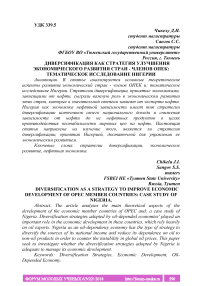Diversification as a strategy to improve economic development of OPEC member countries: case study of Nigeria
Автор: Chikelu J.I., Sangov S.S.
Журнал: Форум молодых ученых @forum-nauka
Статья в выпуске: 6-3 (22), 2018 года.
Бесплатный доступ
The article analyzes the main theoretical aspects of the development of the economic member countries of OPEC and: a case study of Nigeria. Diversification strategies adopted by oil-depended economies' played an important role in the economic development in these countries, which rely heavily on oil exports. Nigeria as an oil-dependency economy has the type of strategy to diversify the sources of its national income and reduce its dependence on oil to non-oil products in order to counter the instability in global oil prices. This paper seek to investigate whether the diversification strategies adopted by Nigeria is adequate to manage its economic development.
Diversification strategies, economic development, oil-depended economy
Короткий адрес: https://sciup.org/140283720
IDR: 140283720
Список литературы Diversification as a strategy to improve economic development of OPEC member countries: case study of Nigeria
- Abogan, O. P.; Akinola, E. B. and Baruwa, O. I. (2014) "Non-oil export and Economic growth in Nigeria (1980- 2011)". Journal of Research in Economics and International Finance (JREIF). Vol. 3, no. 1, pp. 1-11
- Adejugbe, 1997. Stimulating non-oil development through marketing and trading strategies, CBN economic and financial review, volume 35, no.4, pp.67-79
- Abou-Stait, F. (2005) "Are Exports the Engine of Economic Growth? An Application of Cointegration and Causality Analysis for Egypt, 1977-2003". African Development Bank, Economic Research Working Paper. No 76, July. Adekunle J.A., 2012. Non-oil exports can generate N310bn for Nigeria-expert agency reports August 05
- Adedipe, B. (2004) "The Impact of Oil on Nigeria's Economic Policy Formulation". A paper presented at the conference on Nigeria: Maximizing Pro-poor Growth: Regenerating the Socio-economic Database, organized by Overseas Development Institute in collaboration with the Nigerian Economic Summit Group, 16th / 17th June
- Adeloye L. 2012. Non-oil exports: role of incentives and challenges. Punch, February 24
- Adewuji, 2005. Trade and exchange policy reform and export performance in Nigeria. Nigerian Economic Society (NES) annual conferencepp.748-771
- Aigbokhan B.E, 2008, Growth, Inequality and poverty in Nigeria. United Nations Economic Commission for Africa (UNECA), Addis Ababa, Ethiopia
- Basher I.H., 2012. Diversifying Nigeria‟s economy through non-oil export promotion. Leadership newspaper, May 13
- Central Bank of Nigeria (2008) Statistical Bulletin, Golden Jubilee Edition, December, 2008. Central Bank of Nigeria (2010) Annual Report for the Year Ended 31st December. Abuja: Central Bank of Nigeria. 10. Central Bank of Nigeria (2013) Annual Report for the Year Ended 31st December. Abuja: Central Bank of Nigeria
- Enoma, A. and Isedu, M. 2011. The Impact of Financial Sector Reforms on Non-Oil Export in Nigeria, Journal of Economics Vol 2(2)Pp 115-120
- Ezeudu, I. J. (2014) "Evaluation of Non-Oil Contribution in Export Financing the Development of Nigeria's Economy: An Empirical Analysis of Export Processing Zone". Research Journal of Finance and Accounting. Vol. 5, no. 6, pp. 58-63
- Ikpe M., 2012, "Determinants of Nigeria's Non-Oil Import Demand" An M.Sc Thesis, University of Nigeria, Nsukka
- Iyoha, M. A. and Oriakhi, D. (2002) "Explaining African Economic Growth Performance: The Case of Nigeria". A Revised Interim Report on Nigerian Case Study prepared for the African Economic Research Consortium Research, May
- Koester, U. 1986. "Regional cooperation to improve food security in southern and eastern African countries". Research report 53, international food policy research institute, Washington DC
- Krueger A., 1978, Liberalization attempts and consequences; Foreign Trade Regimes and Economic development series, Vol. 10, Cambridge M.A.: Ballinger publishing
- Obwona M.B. 2001. "Determinants of FDI and their impact on economic growth in Uganda". African development review 2001. Blackwell publishers oxford. UK. pp.46-80
- Olayiwola, K and Okodua, H. 2010. Foreign Direct Investment, Non-Oil Export, and the Economic Growth in Nigeria: A causality Analysis, Ota Nigeria: Covenant Faith University
- Nwidobie, B. M. (2014) "Growth in Nigeria's Non-Oil Export Finance and Non-Oil Export Performance: A Correlational Analysis". International Journal of Business and Social Research (IJBSR). Vol. 4, no. 2, pp. 31-39
- Ogbonna, I. C.; Uwajumogu, N. R.; Chijioke, G. and Agu, S. V. (2013) "Economic Globalization: Its Impact on the Growth of Non-Oil Supply in Nigeria". Journal of Economics and Sustainable Development. Vol.4, no.7, pp. 66-74
- Osuntogun, A., Edordu, C. C. and Oramah, B. O. (1997) "Potentials for diversifying Nigeria's non-oil exports to non-traditional markets". AERC Research Paper. No. 68, November
- Rezaie, M. (2013) "Factors Affecting Non-Oil Exports". Kuwait Chapter of Arabian Journal of Business and Management Review. Vol. 2, no. 5, pp. 17-23
- Usman, O. A. and Salami, A. O. (2008) "The Contribution of Nigerian Export-Import (NEXIM) bank towards Export (non-oil) Growth in Nigeria (1990- 2005)". International Business Management. Vol. 2, no. 3, pp. 85-90
- Utomi Pat (2004) "The Curse of Oil". A Paper delivered for Heinrich Böll Foundation Oil-Conference by Lagos Business School, May
- Zafar, A. (2004) "What happens when a country does not adjust to terms of trade shocks? - the case of oil-rich gabon". World Bank Policy Research, Working Paper. No. 3403, September
- http://venturesafrica.com/nigeria-launch-diaspora-export-programme
- http://www.pulse.ng/news/business/here-are-non-oil-products-seeing-nigeria-out-of-recession-id7374488.html


